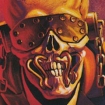In 1992, heavy music was at a major turning point. One year before, Metallica had done the unthinkable and landed a No. 1 album that went platinum in just two weeks. Simultaneously, Nirvana's breakout had spurred the unlikely commercial domination of grunge, which, along with the proliferation of MTV as a hit-making machine, yielded a climate where underground punk and metal acts were suddenly granted above-ground privileges on radio stations and major labels. Creatively, metal was proving its longevity beyond the thrash years by breaking off into myriad subgenres — groove, death, black, rap, industrial, etc. — that were each forming their own self-sustaining audiences.
Looking back now, it's clear that 1992 was one of the most fruitful years in heavy-music history. Bands like Pantera and Dream Theater, who had been at it for a minute, came into their own with genre-defining releases, while newbies such as Rage Against the Machine and TOOL unveiled dazzling opening salvos for historic careers ahead of them. Below, are 20 incredible records from a milestone year.
Alice in Chains - Dirt
Spawning such inescapable hits as "Rooster" and "Down in a Hole," Alice in Chains' heroin-rock classic Dirt leaned heavily into the group's metal influences and perfected the balance between the defining traits of the Seattle grunge scene and the doom-laden Sabbathian influences that paved the way for its inception. Singer Layne Staley's candid exorcisms on the despairs of addiction add a thick layer of depressive angst, making Dirt not only one of the most well-composed albums of its genre, but also arguably the most heart-wrenching. After all, is it even grunge if it doesn't crush your soul?
Babes in Toyland - Fontanelle
While they'll always garner their fair share of comparisons to West Coast contemporaries like Hole and L7, Minnesota's Babes in Toyland were a different beast entirely. Vocalist Kat Bjelland's hooks had a natural immediacy on the band's sophomore breakout, Fontanelle, but the way she curled her voice with barbed-wire snarls, and the sheer level of volume she emitted on songs like the immortal opener, "Bruised Violet," made them more stylistically reminiscent of the no-holds-barred punk of Riot Grrrl scene-leaders Bikini Kill. As punk and grunge bands were pushed toward a more radio-friendly accessibility post-Nevermind, Babes in Toyland kept the wrathful flame burning.
Body Count - Body Count
"Cop killer, better you than me/Cop killer, fuck police brutality." It's been 30 years since, and Ice-T's confrontational lyrics that protested police abuse and hailed freedom of speech have the same jaw-dropping impact now as they did then. Plus, the music bangs. Ice-T and his bandmates' self-titled debut innovatively channeled gangster rap's grim street tales through punk-influenced metal blazers, injecting a fresh and vital perspective into heavy music and facilitating a connection between hip-hop and the wide world of alternative rock that's still thriving today.
Cannibal Corpse - Tomb of the Mutilated
Between its notoriously vomit-inducing cover art and blood-splattering sound, Cannibal Corpse's 1992 LP, Tomb of the Mutilated, is an essential part of the Nineties death-metal canon. Musically, it's a loaded bin of bangers, with an overcrowded cemetery's worth of haggard grooves, dismembering riffage and zombie-like gurgles from vocalist Chris Barnes that put the "ew" in brewtal. "I Cum Blood" and "Hammer Smashed Face" are timeless standouts, but the whole album still cuts harder and deeper than practically anything in its class.
Danzig - Danzig III: How the Gods Kill
1992's Danzig III: How the Gods Kill cemented former Misfits singer Glenn Danzig as a genuine rock star with songs like "Dirty Black Summer" and the title track, which distanced the muscular frontman even further from his punk roots. At the same time, Danzig III was hardly a typical metal album. Sure, the guitars were heavy and distorted and many of the songs were angry and brooding. But the band's Delta blues influences and Glenn's melodramatic vocals, which were equally influenced by Jim Morrison, Elvis Presley and Ozzy Osbourne, fused together into a novel sound.
Darkthrone - A Blaze in the Northern Sky
Darkthrone's A Blaze in the Northern Sky is the first in a trio of albums — dubbed the "Unholy Trinity" — that essentially codified black metal as a genre. It has production that sounds like it was tracked to tape in a cobweb-filled basement, sputtering guitar tones that slice like a rusty saw blade, demon-like shrieks from Nocturno Culto, and instrumental parts that siphon the most evil morsels from doom, hardcore and early death metal and brew them together into a wicked elixir of pure chaos.
Dream Theater - Images and Words
Dream Theater's Images and Words was by no means the first prog-metal album, but 30 years after its release, it has become one of the genre's go-to entry points. Following the path that Queensrÿche and Fates Warning blazed in the Eighties, Dream Theater pushed prog-metal it to its virtuosic extremes — wonky time signatures, through-composed song structures, mind-bending drumming from Mike Portnoy, and a melodically appealing vocal delivery from James LaBrie that held it all together with power metal's epic spirit.
Faith No More - Angel Dust
The follow-up to 1989's The Real Thing, Faith No More's platinum-selling breakthrough, the brilliantly warped Angel Dust defied industry and fan expectations alike by serving up a dark, difficult and occasionally disjointed set of 13 songs (including live staples like "Caffeine" and "Midlife Crisis"). Does any of them resemble "Epic," Faith No More's Top 10 rap-rock hit from 1990? Nope. But there is a song ("Be Aggressive") that juxtaposed a cheerleader chant popular at sporting events with sadomasochistic lyrics about man-on-man oral sex.
Godflesh - Pure
Godflesh's Pure is one of those rare albums that mastered one subgenre (industrial metal) while simultaneously pioneering another (post-metal). Justin Broadrick's second LP after exiting the grindcore pioneers Napalm Death wields the drum machine like a weapon of war, programming intensely rigid rhythms that batter ceaselessly for upwards of 10 minutes at a time. Above the beat are coarse blankets of steel-wool guitar racket that tatter and scrape as much as they sew brilliantly into a beautiful tapestry of celestial noise.
Helmet - Meantime
Snatched up a major label (Interscope) in the wake of Nirvana's success, NYC noise-rock stalwarts Helmet did little to tone down their abrasive sound from its AmRep roots to suit their new home. Their second album's industrial-strength, staccato riffs pack a serious punch, while Page Hamilton's roars peel paint off walls. Single "Unsung" has its poppy moments, but still culminates in a decidedly radio-unfriendly one-and-a-half minute instrumental outro. Meanwhile, opener "In the Meantime" slams hard enough to have been covered by Lamb of God, Soulfly and Pig Destroyer over the years.
L7 - Bricks Are Heavy
Bricks Are Heavy may have been L7's major label debut, but that didn't stop them from playing with the brute force of the album's titular object being chucked through a stained-glass mural. While their previous albums captured their wild grunge-punk energy, this one has the stronger set of songs, between the steam-rolling catchiness of "Pretend We're Dead" and the doomy trudge of "Diet Pill," to the snaggle-toothed sneer of rippers like "Wargasm" and "Shitlist." As gigantically catchy as any glam-metal band, and as ferocious as any basement punk head-steppers.
Megadeth - Countdown to Extinction
If Metallica could do it, then Megadeth could, too. After seeing his former band rocket to mainstream acclaim with their chart-smashing Black Album, Dave Mustaine decided to pare back the technical heights he achieved on 1990's Rust in Peace and make a record that was easier to latch onto — and he succeeded with his band's career-altering 1992 opus, Countdown to Extinction. Standouts like "Sweating Bullets" and "Symphony of Destruction" became some of their biggest songs, refortifying Megadeth's relevance even in a rapidly changing metal landscape.
Ministry - Psalm 69
Ministry never should have crossed into the mainstream, but somehow Psalm 69's speed-laced, Gibby Haynes-assisted single, "Jesus Built My Hotrod," released in advance of the album, was a runaway hit on MTV. By the time the LP dropped in '92, the industrial-metal miscreants had secured a main-stage spot at that summer's Lollapalooza. This exposure, as well as what they received from follow-up singles such as "N.W.O" and the brilliant junkie homage (and William Burroughs collab) "Just One Fix," helped Psalm 69 break into Billboard's Top 30 — one of the most caustic, uncompromising albums to ever do so.
Nine Inch Nails - Broken
There's nothing better than a "fuck you" record and Broken is one of the best. Ever. After the breakout success of his synth-pop debut, Pretty Hate Machine, Trent Reznor wanted to explore heavier territory with Nine Inch Nails and his label wasn't having it — which led to an infamous feud. That righteous rage boils throughout each of the teeth-gnashing masterpieces on this explosive EP, featuring songs like "Last" and "Wish" that merge the ear-splitting power of harsh noise with the physical thrust of metal.
Obituary - The End Complete
Obituary's The End Complete chiseled the band's logo onto the Mount Rushmore of the Florida death-metal pantheon. Following their gurgling debut, Slowly We Rot, and the even soupier Cause of Death, the band's third LP may not be their magnum opus, but it's still an immensely enjoyable collection of OSDM nastiness. Its lumbering grooves hang like half-dead weeping willows over swampy waters, topped with John Tardy's bile-spewing croak and Allen West's pointy lead licks that emerge from the muck like demon toads floating up from beneath the filthy bog silt.
Pantera - Vulgar Display of Power
Vulgar Display of Power "truly encapsulated the Pantera sound," as Philip Anselmo explained to us for the record's 20th anniversary. He's not wrong. The band's second album as the groove-metal powerhouse they're known for was a complete game-changer, a still-unmatched triple-threat of thrash technicality, death-metal power, hardcore energy and hard-rock swagger. The savory riffage of "Mouth for War" and "Walk," the violent rage of "Fucking Hostile," the meld of balladry and bash-adry on "This Love" and "Hollow" — it's damn-near untouchable.
Rage Against the Machine - Rage Against the Machine
On their 1992 debut, Rage Against the Machine came onto the scene with a radical fusion of politically scathing hip-hop, funky metal and shreddy hard rock that was all delivered with the urgency and aggression of hardcore punk. Their aims were clear — "Take the Power Back," "Know Your Enemy" — and their tactics were righteously inflammatory: "Fuck you, I won't do what you tell me." It's been 30 years and this album's blood-boiling impact hasn't waned an inch.
Stone Temple Pilots - Core
Stone Temple Pilots were at their heaviest and darkest on their 1992 debut, Core, which announced Scott Weiland and Co. as an alternative-rock force to be reckoned with. The album opens with an unfuckwithable one-two punch, the morbid doom-blues of "Dead & Bloated" followed by the controversy-courting firestarter "Sex Type Thing." But STP were just getting started. "Wicked Garden." "Creep." "Plush." The hits keep coming and hitting hard.
TOOL - Opiate
This is where it all started. A year before their debut album, Undertow, TOOL introduced themselves to the world with a six-track EP that boasts some of their hardest-hitting songs to date. Opiate doesn't feature the mind-bending prog elements that would make them alt-metal icons later on in their career; instead, "the music was all about emoting and releasing that primal scream," as Maynard James Keenan told us. And what a scream it is, captured on all-time invectives like "Hush" and "Part of Me."
White Zombie - La Sexorcisto: Devil Music Volume One
No one who caught White Zombie playing CBGB in their early, noise-rock incarnation could have guessed the heights they would soon scale. 1992's La Sexorcisto: Devil Music Volume One saw the NYC underdogs transform into a heavy-metal monster with an unstoppable groove, picking up tours with Danzig and Pantera and even earning an unexpected Grammy nomination. As a testament to its longevity, the eternal headbang anthem "Thunder Kiss '65" is still a staple in Rob Zombie's solo sets.








